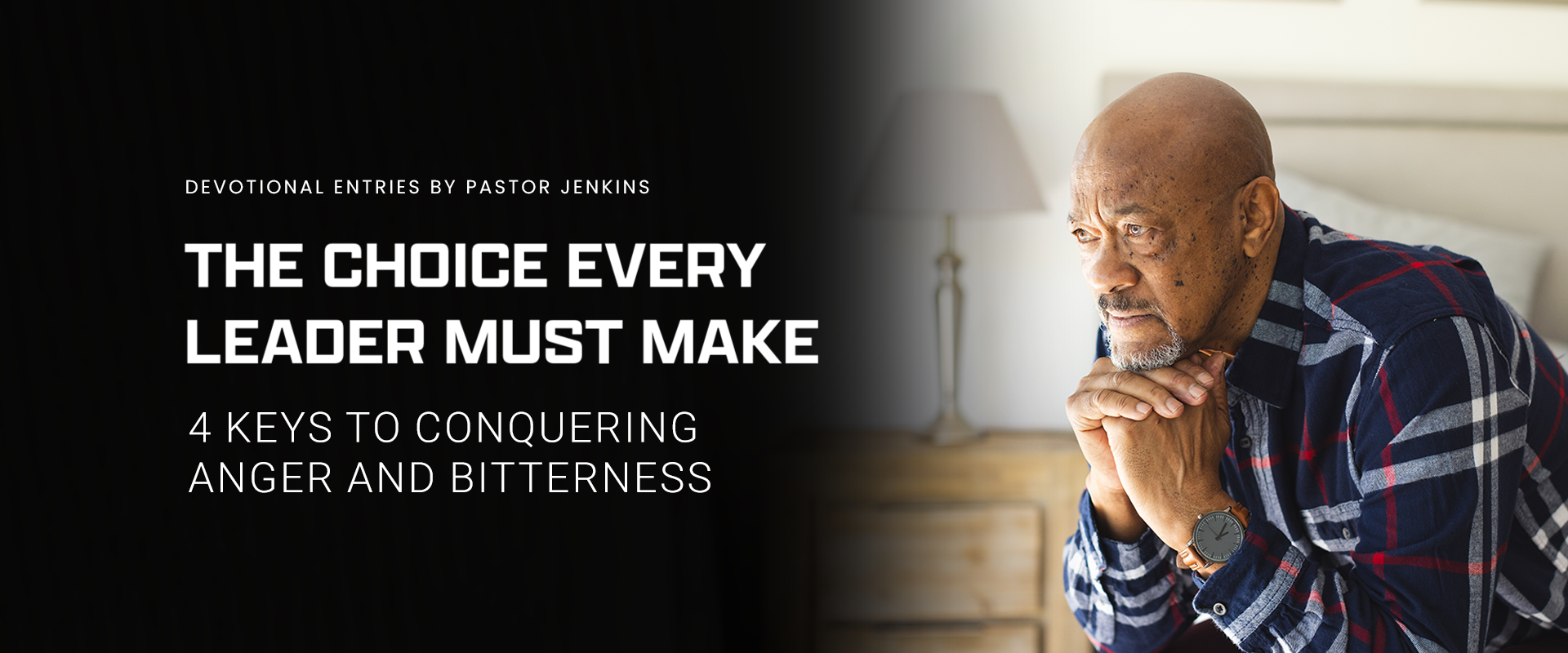
As leaders, we all will encounter situations that can strengthen us in the places we lead. However, these same circumstances can also have the potential to the harboring of bitterness and anger.
If that is you, you aren’t alone. In fact, God’s people struggled with this as well.
A Man After God’s Heart
Finding his beginnings in the field as a lowly shepherd boy, David was very quickly thrust into a new life calling as a prophet prophesied that he would one day become the king of Israel. Yet even with this great anointing over his life, he was a man who was no stranger to drama.
David experienced many trials and mistakes throughout his life, both for good and bad. (In fact, his responses to these things sometimes left me scratching my head in confusion.) But regardless of how David responded, God eternally looked to him and reaffirmed his heart as a leader.
In Acts 13:22, NKJV, the Holy Spirit inspires the words of Luke:
“I have found David the son of Jesse, a man after My own heart, who will do all My will.”
I don’t know about you, but when all is said and done, and I am at the throne of God, my prayer is that God will look upon my life and declare that John Jenkins was a man always in pursuit of Him!
Influence on Leadership
Throughout my leadership, I have learned there are two types of powers: the power of position and the power of influence.
While we may think the person in position has all the power, it is truly the one holding influence that is able to inspire, guide, and sway their decisions. Think about the president of our country. It is not he who has the final say on bills and amendments, but rather through the guidance of his Cabinet and the final decision of Congress that new laws are made.
As king of Israel, David is surrounded by many who are attempting to influence him, but for one man, this influence means life or death.
A Great Shift
“Now the advice of Ahithophel, which he gave in those days, was as if one had inquired at the oracle of God. So was all the advice of Ahithophel both with David and with Absalom.”
2 Samuel 16:23, NKJV
Ahithophel was a trusted counselor and advisor to King David. He had such an anointing over his life that the Bible says when he spoke, it was like an oracle of God. It was as if God was speaking with David and his son, Absalom!
Throughout God’s word, He uses people as his mouthpieces to influence people in positions of power. And quite often, He still works in this way today. (However, some of you have chosen to listen to people who are influencing your thoughts and actions that are opposite of God’s will for your life.)
When we look exactly one chapter later, there has been a shift in Ahithophel’s thought process, and he makes a choice that can leave us scratching our heads.
“Now when Ahithophel saw that his advice was not followed, he saddled a donkey, and arose and went home to his house, to his city. Then he put his household in order, and hanged himself, and died; and he was buried in his father’s tomb.”
2 Samuel 17:23, NKJV
This great advisor went from being a spokesperson for the Most High to committing suicide. Something happened to this man that caused him to make the horrifying decision to end his life. But what happened?
Let’s fast forward to a season in David’s leadership where the choices he was making were causing emotional, spiritual, and physical turmoil.
David has engaged in adultery with Bathsheba. This act not only violates his current marriages, but also against her marriage to Uriah. She becomes pregnant with David’s child, so he schemes a dishonest plan to trick Bathsheba’s husband (who was away at war) into sleeping with her. When that doesn’t pan out how he would like, he orders Uriah’s military commander to put him on the front lines in order to kill him. Finally, once Uriah is killed, David takes Bathsheba as one of his many wives.
This whirlwind of acts deeply grieved Ahithophel. You see, not only was Bathsheba his granddaughter, but the death of Uriah meant a death in his family line. How could a man after God’s own heart do such unspeakable things? (Well, as much as our hearts are focused on and devoted to God, we all have a lot of nasty within us.)
The reality is that when we make a conscious choice to follow through with a sinful act, there are repercussions, and people are watching. David, thinking no one would notice his sin, was found out by his counselor, Ahithophel, and it caused him to become extremely angry and bitter. Ahithophel became so angry that he cut off his relationship with David and joined forces with David’s son, Absalom (who would attempt to overthrow David’s role as king), and ultimately, in the end, while overcome with grief, would end his life.
So, how can we learn from Ahithophel when circumstances threaten to derail us as leaders? Let’s look at four keys to overcoming our bitterness.
4 Keys to Overcoming Bitterness
There are many descendants of Ahithophel living among us today. And while they may not be committing physical suicide, they are slowly killing themselves by the horrible choices they make daily. Some of you have had horrific things done to you and said about you. You have partnered with bitterness and unforgiveness, and it is damaging you from the inside out.
Saints, if you don’t learn to take the reins of control over your anger, it will destroy you. And sadly, you cannot have a true, thriving relationship with God when you are living a life harboring bitterness in your heart.
So, what are the things we should be mindful of when walking through times of pain?
1. Realize Their Actions Are Not Worth Damaging Your Relationship with God.
Unfortunately, when you allow someone to embitter you, it impacts your personal relationships with God. And while it doesn’t affect your salvation, it does affect God’s willingness to forgive you of your own sins.
“For if you forgive men their trespasses, your heavenly Father will also forgive you. But if you do not forgive men their trespasses, neither will your Father forgive your trespasses.”
Matthew 6:14-15, NKJV
When we choose unforgiveness, we are forfeiting the forgiveness of God. Take heart; the moment we accept Jesus as our Lord and Savior, the Holy Spirit comes to dwell within us. And while we cannot in our flesh forgive what was done to us, by way of His Spirit, we can extend the forgiveness of God.
Be on your guard, saints, whatever was done to and against you is not worth risking your relationship with God.
2. Realize That God is the Ultimate Judge
It can be difficult to believe that God sees the hurt someone has placed upon you. It can be even more challenging to trust that God is our vindicator in all things. However, scripture commands us not to take matters into our own hands.
“Beloved, do not avenge yourselves, but rather give place to wrath, for it is written, ‘Vengeance is mine, I will repay,’ says the Lord.”
Romans 12:19, NKJV
When people violate you, they aren’t only offending you; they are offending the Most High God! They wronged you, and God saw it. Be on your guard to seek revenge because just as God witnessed the pain done to you, He will also be watching as you try to pay others back!
God is the ultimate judge, and He will pay back what was violated.
3. Realize That You Are Not Sinless
As you are navigating your own pain, be careful not to be so quick to find the wrong in others without remembering those you have hurt.
“And why do you look at the speck in your brother’s eye, but do not consider the plank in your own eye? Or how can you say to your brother, ‘Let me remove the speck from your eye’; and look, a plank is in your own eye? Hypocrite! First remove the plank from your own eye, and then you will see clearly to remove the speck from your brother’s eye.”
Matthew 7:3-5, NKJV
As you are quick to inspect the damage done to you, remember that no one is perfect or sinless. Forgiveness is needed on all sides, and just as we need God’s forgiveness, we too need to forgive others.
4. Realize That Pain Helps Promote You
Pain is hard to experience. But if the one who hurt you hadn’t made the choices they did, you wouldn’t be where you are today!
“My brethren, count it all joy when you fall into various trials, knowing that the testing of your faith produces patience. But let patience have its perfect work, that you may be perfect and complete, lacking nothing.”
James 1:2-4, NKJV
Consider Joseph: he was hated by his brothers, sold into slavery, lied on by Potiphar’s wife, and forgotten about by his prison mate. Yet, all of these things helped to get him to where God wanted him to be. And the same goes for the pain you are experiencing, too.
Regardless of what you are experiencing, God is with you, and He sees you. Be cautious not to allow bitterness to take root in your heart. Leave room for God’s redemptive power to permeate your painful places, and watch how he allows you to conquer your greatest pain and bitterness.
For more on how to defeat life’s bitterness, check out Pastor Jenkins’ sermon, The Keys to Conquer Anger and Bitterness.


